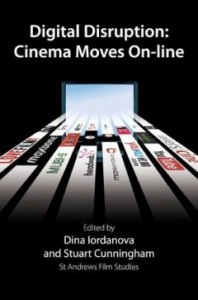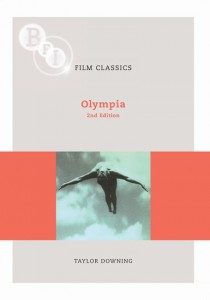New Books in April
 Digital Disruption: Cinema Moves On-line
Digital Disruption: Cinema Moves On-line
Edited by Dina Iordanova and Stuart Cunningham
(St Andrews Film Studies), 223 pages
ISBN: 978-0956373090 (hardback), £35
ISBN: 978-0956373076 (paperback), £13.99
ISBN: 978-1908437006 (Kindle), £9.99
http://stafs.org/
‘Nobody knows anything’, said William Goldman of studio filmmaking. The rule is ever more apt as we survey the radical changes that digital distribution, along with the digitisation of production and exhibition, is wreaking on global film circulation. Digital Disruption: Cinema Moves On-line helps to make sense of what has happened in the short but turbulent history of on-line distribution. It provides a realistic assessment of the genuine and not-so-promising methods that have been tried to address the disruptions that moving from ‘analogue dollars’ to ‘digital cents’ has provoked in the film industry. Paying close attention to how the Majors have dealt with the challenges – often unsuccessfully – it focuses as much attention on innovations and practices outside the mainstream. Throughout, it is alive to, and showcases, important entrepreneurial innovations such as Mubi, Jaman, Withoutabox and IMDb. Written by leading academic commentators that have followed the fortunes of world cinema closely and passionately, as well as experienced hands close to the fluctuating fortunes of the industry, Digital Disruption: Cinema Moves On-line is an indispensable guide to great changes in film and its audiences.
About the Authors: Dina Iordanova is Professor of Film Studies at the University of St. Andrews. A specialist in world cinema, with expertise in Film festivals and the cinema of the Balkans, Eastern Europe and Europe in general. Recent co-edited volumes include Film Festivals and East Asia (2011) and The Festival Circuit (2009).
Stuart Cunningham is Professor of Media and Communications, Queensland University of Technology, and Director of the ARC Centre of Excellence for Creative Industries and Innovation. Recent publications include: What Price a Creative Economy? (2006) and In the Vernacular: A Generation of Cultural Criticism and Controversy (2008).
 Hollywood’s Copyright Wars: From Edison to the Internet
Hollywood’s Copyright Wars: From Edison to the Internet
By Peter Decherney
(Columbia University Press) 304 pages
ISBN: 978-0231159463 (hardback), £24.00
www.cup.columbia.edu/
Copyright law is important to every stage of media production and reception. It helps determine filmmakers’ artistic decisions, Hollywood’s corporate structure, and the varieties of media consumption. The rise of digital media and the internet has only expanded copyright’s reach. Everyone from producers and sceenwriters to amateur video makers, file sharers, and internet entrepreneurs has a stake in the history and future of piracy, copy protection, and the public domain. Beginning with Thomas Edison’s aggressive copyright disputes and concluding with recent lawsuits against YouTube, Hollywood’s Copyright Wars follows the struggle of the film, television, and digital media industries to influence and adapt to copyright law. Many of Hollywood’s most valued treasures, from Modern Times (1936) to Star Wars (1977), cannot be fully understood without appreciating their legal controversies. Peter Decherney shows that the history of intellectual property in Hollywood has not always mirrored the evolution of the law. Many landmark decisions have barely changed the industry’s behavior, while some quieter policies have had revolutionary effects. His most remarkable contributions uncover Hollywood’s reliance on self-regulation. Rather than involve congress, judges, or juries in settling copyright disputes, studio heads and filmmakers have often kept such arguments “in house,” turning to talent guilds and other groups for solutions. Whether the issue has been battling piracy in the 1900s, controlling the threat of home video, or managing modern amateur and noncommercial uses of protected content, much of Hollywood’s engagement with the law has occurred offstage, in the larger theater of copyright.
About the Author: Peter Decherney is associate professor of cinema cinema studies, English, and communication at the University of Pennsylvania and author of Hollywood and the Culture Elite: How the Movies Became American (2006).
 Olympia – 2nd edition (BFI Film Classics series)
Olympia – 2nd edition (BFI Film Classics series)
By Taylor Downing
(BFI Palgrave Macmillan), 128 pages
ISBN: 978-1844574704 (paperback), £10.99
Leni Riefenstahl’s Olympia (1938) is one of the most controversial films ever made. Capitalising on the success of Triumph of the Will (1935), her propaganda film for the Nazi Party, Riefenstahl secured Hitler’s approval for her grandiose plans to film the 1936 Berlin Olympics. The result was a work as notorious for its politics as celebrated for its aesthetic power. This revised edition includes new material on Riefenstahl’s film-making career before Olympia and her close relationship with Hitler. Taylor Downing also discusses newly-available evidence on the background to the film’s production that conclusively proves that the film was directly commissioned by Hitler and funded through Goebbels’s Ministry of Propaganda and not, as Riefenstahl later claimed, commissioned independently from the Nazi state by the Olympic authorities. In writing this edition, Taylor Downing has been given access to a magnificent new restoration of the original version of the film by the International Olympic Committee.
About the Author: Taylor Downing is a television producer who co-founded Flashback Television in 1982 and has produced well over 200 documentaries. He is the author of several books, including, most recently, Spies in the Sky: The Secret Battle for Aerial Intelligence during World War II (2011) and Churchill’s War Lab: Code Breakers, Boffins and Innovators: The Mavericks Churchill Led to Victory (2010). He regularly writes and lectures on television and history
Raising The Civil Dead: Prisoners and Community Radio
By Heather Anderson
(Peter Lang), 275 pages
ISBN 978-3034310451 (paperback), £ 48.00
www.peterlang.com
What is prisoners’ radio? Who is involved in «creating» these types of programs and what influence do they have on discourses of law and order? Internationally, radio that operates for, or by, prisoners exists almost exclusively within the community radio context. Little has been documented about the genre so far. Raising the Civil Dead seeks to address this lack of information. It examines prisoners’ radio as citizens’ media, connecting directly to notions of civic responsibility. It focuses on the ways in which people produce media and how these activities transform those individuals. The research is the result of four in-depth case studies conducted in two countries, complemented by an international inventory of prisoners’ radio programs and stations. Contents: Theorising community radio – Participating in the public sphere – Prisoners, citizenship and the public sphere – A methodology for studying Prisoners’ Radio – An international inventory of Prisoners Radio – Four case studies from Australia and Canada – Prisoners radio as citizens’ media – Prisoners’ radio in the public sphere.
About the Author: Heather Anderson completed her doctorate in 2008 and currently lectures in Media Studies, Journalism and Social Enterprise at Griffith University, Queensland, Australia. She has been involved in the community radio sector since the early 1990’s, especially with Brisbane station, 4ZzZ.
Russian Film Posters
Introduction by Maria-Christina Boerner
(Vivays Publishing), 200 pages with 161 illustrations
ISBN: 978-1908126153 (hardback), £19.95
www.vivays-publishing.com/
Presenting 161 posters of the Russian and Soviet silent film era from the turn of the twentieth century until 1934, these images from rarely seen Russian archives, provide a visual history of both the cinema of that time as well as the development of advertising graphics from the earliest naïve Russian style of Assaturov to the sophisticated constructivist graphics of Rodchenko and Malevich. Distinctive in their approach representing film and in the use of typography and simple powerful graphics, the style of this period continues to influence designers and artists today. With detailed information about each artist and film, Russian Film Posters is a resource for collectors, film historians, designers and artists.
About the Author: Maria-Christina Boerner studied literature, art history and media in Berlin. A lecturer at the University of Fribourg (Switzerland), she is also the author of numerous essays on cultural topics.
 Learning on Screen
Learning on Screen
